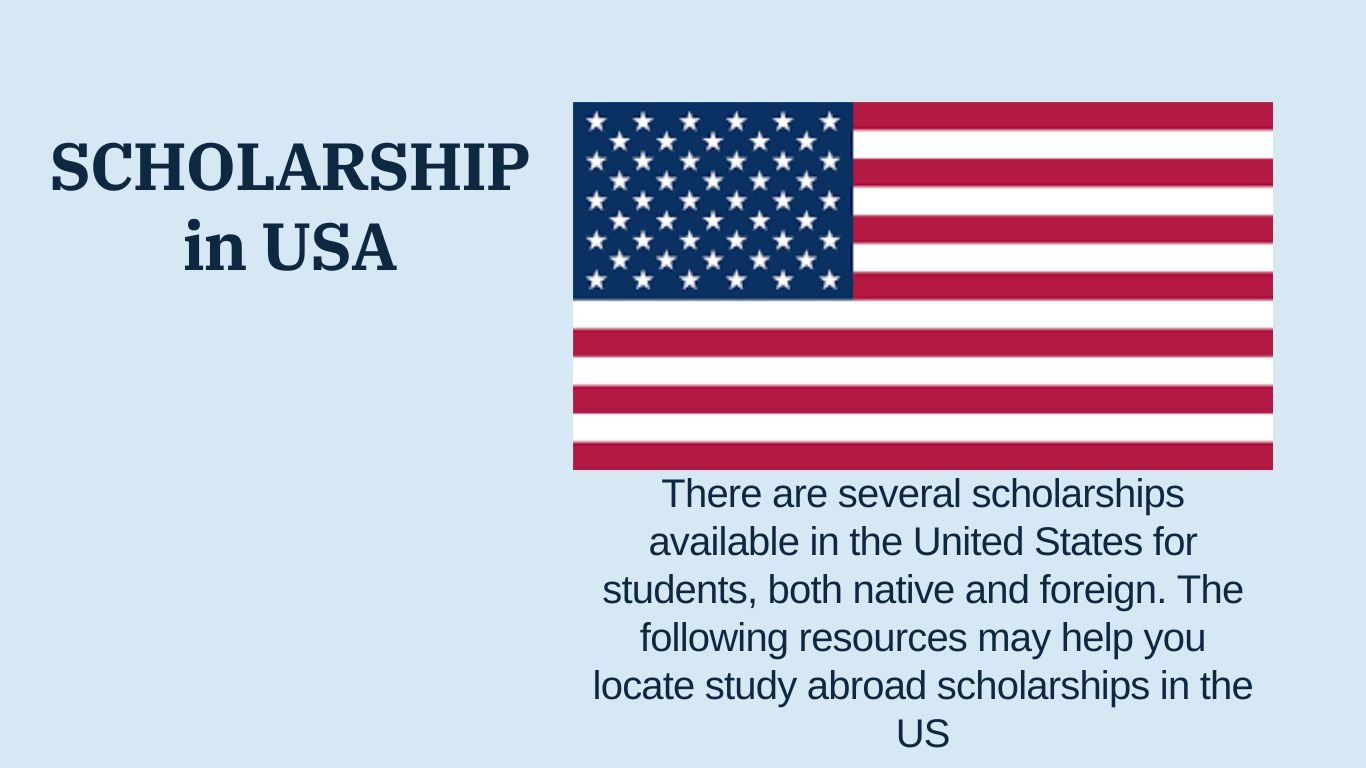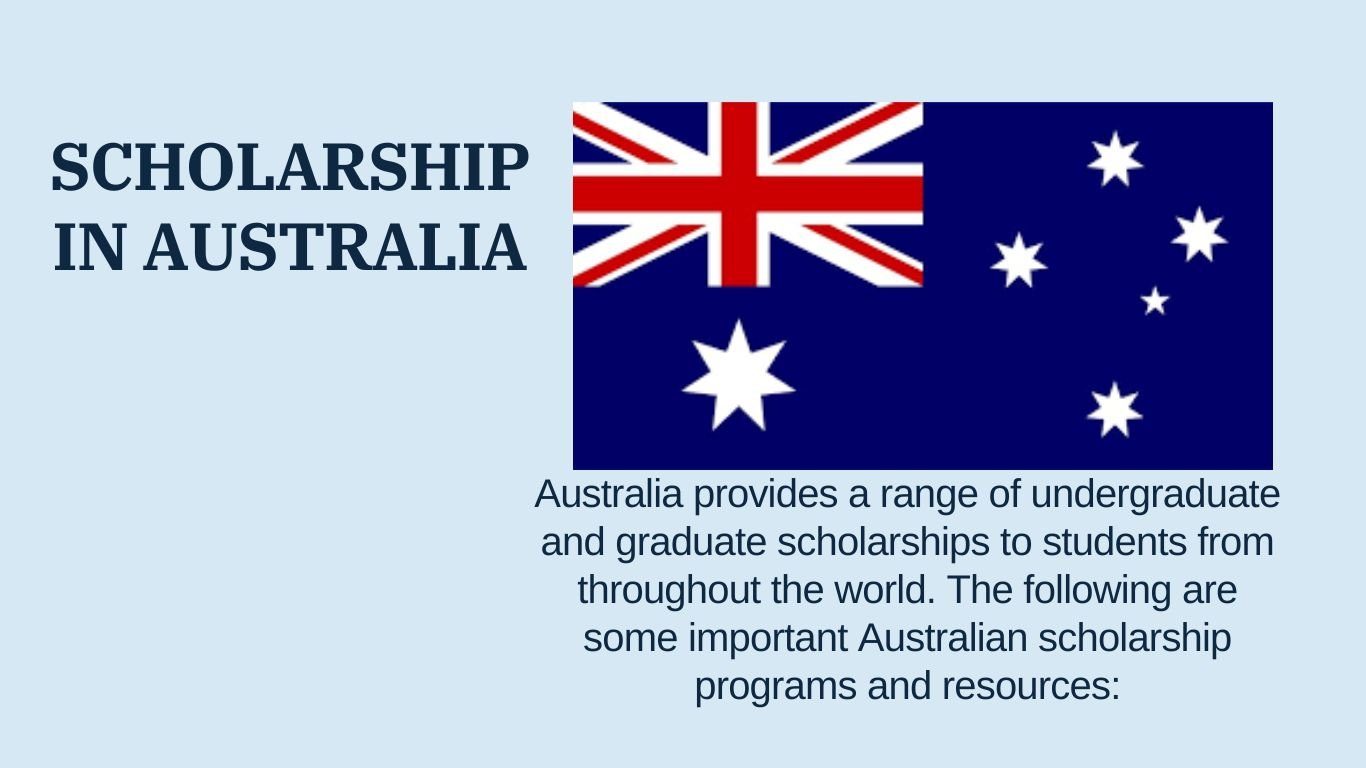International Scholarship Opportunities – I can tell you where to look for scholarship chances even though I don’t have access to real-time data.
There are many other types of scholarship possibilities available, including ones from foundations, governments, colleges, and organizations.
To remain informed about fresh overseas scholarship prospects, contemplate utilizing the subsequent approaches:

Scholarship Online Resources:
Check out specialized scholarship websites such as Studyabroad.com, Fastweb, Chevening, and Scholarship.com. These platforms frequently add new chances to their databases on a regular basis.
Academic Websites:
Examine the official websites of any colleges or other educational establishments in the nation you are considering. They frequently offer details on international students’ access to scholarships.
Websites run by the government:
Visit the national websites of the country you intend to study in. International students can apply for scholarships from numerous governments.
Internet forums and platforms:
Participate in online forums and platforms that deal with education and scholarships. New scholarship opportunities are frequently shared on websites such as College Confidential, Reddit (subreddits liker/scholarships), and other educational communities.
Social Networks:
Keep up with scholarship sources, colleges, and learning institutions on social networking sites like Facebook, LinkedIn, and Twitter. They use these networks to frequently publicize fresh possibilities.
Newsletters:
Sign up for newsletters from companies that offer information on scholarships. In this manner, regular information will arrive in your inbox.
Creating a network:
Make contact with instructors, former students, or enrolled students at the universities that interest you. They might be able to point you in the direction of pertinent resources or have information regarding scholarships.
Consulates and Embassies:
Get in touch with the embassy or consulate of the nation you intend to study in. They might be able to provide information about overseas students’ access to scholarships.
Before applying, don’t forget to do your homework, confirm that the scholarship is legitimate, and make sure you match the requirements. Furthermore, be mindful of the dates for applications, as they fluctuate for various scholarships.
LEGITIMATE SCHOLARSHIP

International Scholarship Opportunities– Verifying a scholarship’s validity is essential to avoiding fraud and frauds. The following advice can assist you in determining whether a scholarship opportunity is legitimate:
Authorized Sources:
Consult the official websites of respectable colleges, authorities, and well-known scholarship providers to begin your quest. Usually, formal methods are used to advertise scholarships that are legitimate.
Details of Contact:
Verifiable and easy-to-find contact details are supplied by legitimate organizations. Verify that the phone number, physical address, and email address are active.
If the only way to get in touch is using a generic email address, proceed with caution.
Specific Details:
Reputable scholarship programs include comprehensive details regarding requirements for eligibility, how to apply, when to submit your application, and how the application is chosen. Therefore watch out for ambiguous or lacking information.
No Charges:
There are legitimate scholarships that don’t charge an application fee up front. If a scholarship requests payment, proceed with caution since this is frequently an indication of fraud.
Claim Verification:
Check the information provided by the scholarship giver. Verify whether the organization is well-known, has a track record of awarding scholarships, and has received favorable feedback from past winners.
Spelling and grammar:
Take note of the communication’s quality. Information from reputable organizations is typically given in an elegantly composed manner. Misspellings and poor grammar could be a warning sign.
Look for warning signs:
If a scholarship offers guaranteed awards without any competition, sounds too good to be true, or asks for more personal or sensitive information than is required for the application, proceed with caution.
Examine the Company:
Look up the company that is providing the scholarship. Examine their online presence, website, and any reviews that are accessible. Trustworthy establishments maintain an open and visible web presence.
Check with Academic Institutions:
If the scholarship is linked to a certain university or other educational establishment, get in touch with them immediately to confirm that the scholarship program is in place.
Speak with Advisors:
Consult educators, school counselors, or education experts for guidance. They might be able to shed light on the validity of particular scholarship programs.
Always follow your gut and use caution if something seems off. It is best to get advice from authorities or reputable educators if you have any questions. But keep in mind that respectable scholarships are intended to aid, not to defraud, students in their academic endeavors.
REQUIREMENT

International Scholarship Opportunities – In case you’re searching for scholarship requirements, always keep in mind that these can differ significantly based on the scholarship provider, the kind of scholarship, and the planned field of study.
However, typical criteria for scholarships frequently consist of:
Academic Achievement:
A solid academic record is sometimes required for scholarships, frequently with a minimum GPA or an equivalent criteria.
Scores on Standardized Tests:
Results from standardized tests like the SAT, ACT, GRE, or other pertinent exams may be required for some scholarships.
The recommendation letter(s):
Scholarship applications frequently want reference letters from academics, professionals, or instructors who can attest to your qualifications and character.
Essay or Personal Statement:
An essay or written declaration is frequently needed. This is your chance to highlight your objectives, accomplishments, and reasons for deserving of the award.
Curriculum Vitae (CV) or resume:
It is customary to submit a thorough résumé or CV that highlights your educational background, extracurricular pursuits, and pertinent experiences.
Evidence of Admission or Acceptance:
Proof that you have been accepted or are enrolled in a particular course of study may be required by certain scholarships.
Details of Financial Need:
A few scholarships are need-based and might ask for details about your financial circumstances.
Status of Citizenship or Residency:
Certain citizenship or residency statuses are prerequisites for several scholarships. Verify that you fit these requirements.
Study Area:
Make sure your desired course meets the scholarship requirements, as certain grants may be restricted to specific fields of study.
Participation in the community or extracurricular activities:
Participation in extracurricular activities, leadership positions, and community service are valued by many scholarship programs.
Conversation:
Interviews may occasionally be required as a part of the scholarship application process.
Language Ability:
It could be necessary to provide documentation of your language proficiency, such as TOEFL or IELTS results, if you are studying in a language other than your mother tongue.
Read the scholarship provider’s guidelines very carefully at all times, because these instructions will list the particular conditions and information that you must meet in order to submit a successful application.
Do not hesitate to get in touch with the scholarship provider directly and if you have any queries or require clarification.
DATE OF APPLICATION

International Scholarship Opportunities – The dates by which scholarships must be applied for vary greatly and are determined by the particular scholarship program, the educational institution, or the scholarship provider.
It’s critical to pay close attention to the details supplied by the scholarship provider so as to ascertain the deadline for every opportunity. Here are a few general pointers:
Visit the official website:
Check out the official website of the scholarship provider or the college that is providing the award. Look for the section that details the dates and application process.
Examine the application materials:
Go over all of the application documents in detail and the scholarship guidelines usually include a clear reference of the deadline.
Get in touch with the scholarship provider:
Please do not hesitate to get in touch with the scholarship giver directly if you have any queries or if the deadline is not apparent.
They are able to supply precise and current information. https://www.wur.nl/en/education-programmes/master/practical-information-masters/scholarships-for-international-masters-students.htm
Web-based systems and databases:
However, make use of databases and online scholarship platforms that compile chances. These portals frequently offer information regarding application deadlines.
Get Newsletter Subscriptions:
Therefore, subscribe to the scholarship provider’s newsletter, if one exists. Important announcements, such deadline extensions or new scholarship opportunities, are frequently included in newsletters.
Educational or Research Resources:
Check with the financial aid or scholarship office of the school if you are applying for a scholarship through that particular institution to find out about deadlines.
Establish Reminders:
Set reminders once you’ve determined the application deadline to make sure you send in all necessary materials by the deadline.
Recall that one of the frequent reasons candidates are rejected from consideration is failing to submit their applications by the deadline.
As a result, it’s critical to make a plan, compile all required paperwork, and submit your application well in advance of the deadline.
I might be able to supply you with further information if you give me specifics about the scholarship you’re interested in.
TYPES OF SCHOLARSHIP

International Scholarship Opportunities- Firstly, Scholarships can be classified according to a variety of criteria and take many different forms. Here are a few typical categories of scholarships:
Academic Merit Scholarships:
Apparently, this is given to students in accordance with their performance on merit-based assessments, standardized test results, or other criteria.
Scholarships Based on Need:
Although, this is given to students who show a need for financial assistance. The goal of these scholarships is to increase access to education for people with low incomes.
Sports Scholarships:
On the other hand, this is given to people who exhibit exceptional athletic ability. Universities frequently give these scholarships in an effort to entice gifted players to join their sports teams.
Subject-specific Financial Aid:
This is however awarded to students studying studies in the humanities, arts, commerce, or STEM fields (science, technology, engineering, and mathematics).
Scholarships for Minorities:
intended to assist students from minority groups that are underrepresented, fostering inclusion and diversity in the classroom.
Scholarships offered abroad:
offered to students from nations other than the one in which the university is situated. These scholarships encourage international cooperation and interaction.
Scholarships for Community Service:
given to students who have proven their dedication to voluntary work and community service.
Scholarships for Leadership:
given to people who have proven to be excellent leaders in a variety of settings, including the community, school, and extracurricular activities.
Scholarships for First-Generation College Students:
Geared toward college-bound students who are the first in their family to enroll. First-generation students’ aspirations to further their education are supported by these scholarships.
Scholarships for women in STEM fields:
designed to support gender diversity in STEM sectors by catering to female students seeking degrees in science, technology, engineering, or mathematics.
Scholarships for the Creative Arts:
Accessible to students pursuing degrees in creative subjects like music, literature, performing arts, or visual arts.
Scholarships for the Military:
Available to students who have served in the armed forces or who want to join the force.
Corporate Grants:
These corporate or business-sponsored scholarships are frequently associated with the industry or area of interest of the sponsoring organization.
Government-Sponsored Awards:
Supplied by government organizations to aid in research and teaching programs. These scholarships could be offered on a national or worldwide scale.
Scholarships for Distance Education:
Intended for students pursuing degrees or programs in online education.
These are but a handful of the several specialty scholarships available, each with its own set of requirements and preferences. To find chances that fit your needs, it’s important to take into account your past, educational objectives, and qualifications when looking for scholarships.
SCHOLARSHIP in USA

International Scholarship Opportunities- There are several scholarships available in the United States for students, both native and foreign. The following resources may help you locate study abroad scholarships in the US:
USA Education:
International students can find information about financial aid and scholarships through EducationUSA, a network maintained by the U.S. Department of State. In many nations, there are centers for advice.
Foreign Student Fulbright Program:
International students can apply for scholarships through the Fulbright program to study for master’s or doctorate degrees in the US. The program is quite competitive.
The Humphrey-Huberman Fellowship Program:
Through this program, accomplished mid-career professionals with proven leadership potential spend a year studying at the graduate non-degree level in the United States.
Scholarships from Chevening:
The UK government’s Chevening program gives various scholarships for study in the United States. For qualifying requirements and application information, see their website.
The AAUW, or American Association of University Women:
For women pursuing graduate studies in the United States, AAUW provides grants and fellowships.
Rotary Foundation Global Grant Scholarships:
Scholarships are offered by Rotary International to support graduate-level study or research in a range of subjects.
Private Establishments and Funds:
Look into scholarships provided by organizations in your field of study and private foundations. The Soros Foundation and the Ford Foundation are two examples.
Scholarships awarded by institutions:
International students can apply for scholarships at several American universities. For further information, visit the university’s website and look for the sections on financial aid and services for overseas students.
Databases for Online Scholarships:
To locate a variety of scholarships, use online search engines like Peterson’s, Fastweb, and College Board’s Scholarship Search.
Governmental Awards:
Scholarships are provided by a few federal and state government organizations in the United States. For more information, get in touch with the state education department or the relevant agency.
Verify each scholarship’s eligibility conditions, application procedures, and deadlines. It’s also a good idea to get information about possible scholarships and funding opportunities by getting in touch with the financial aid offices of the universities you are interested in.
Keep in mind that scholarships are subject to change, so it’s important to confirm information from reputable sources.
https://wiredinto.com/index.php/2024/01/09/how-to-get-fully-funded-scholarship-and-study-abroad/
SCHOLARSHIP IN THE UK

International Scholarship Opportunities- International students have several scholarship options to study in the UK. The following resources can help you locate scholarships to continue your education:
Scholarships from Chevening:
Students from more than 160 countries can apply for scholarships through the UK government’s international rewards program, the Chevening Scholarship. It includes living expenses, tuition, and other covers a wide range of areas.
Scholarships from the Commonwealth:
Students from Commonwealth nations are eligible to apply for the UK government-funded Commonwealth Scholarships. These awards are for doctoral and master’s level coursework.
Scholarships from the British Council:
For overseas students, the British Council provides a number of scholarship options. These scholarships frequently have geographical or national restrictions.
Scholarships from Gates Cambridge:
These scholarships, which are funded by the Bill and Melinda Gates Foundation, are given to deserving non-UK students so they can attend the University of Cambridge for postgraduate work.
Rhodes Awards:
The University of Oxford offers distinguished international Rhodes Scholarships for postgraduate study. They are extremely competitive and founded on leadership, dedication to service, and academic excellence.
Scholarships Erasmus+:
Youth, sport, education, and training are all supported across Europe by the Erasmus+ initiative. Students from member nations can apply for scholarships to study in the UK and other European nations.
Awards from the Royal Society:
The Royal Society provides overseas science students with a range of awards and fellowships.
Universities in the UK:
International students can apply for scholarships at many UK universities. These grants could be given out in accordance with need-based criteria, academic merit, or other factors. If you are interested in a particular university, find out what options are available there.
Scholarships awarded by British Marshall:
Young Americans with exceptional talent can study for a graduate degree in the UK thanks to the Marshall Scholarships.
The Fellowships of the Wellcome Trust:
Funding for health and biomedical science researchers, including international students, is provided by the Wellcome Trust.
Read each scholarship’s eligibility restrictions, application requirements, and deadlines thoroughly before submitting an application. For more information and advice, get in touch with the international student office or the scholarship providers at the universities you are interested in.
SCHOLARSHIP IN EUROPE

International Scholarship Opportunities- European Union provides international students with a wide range of undergraduate and graduate scholarship possibilities. The following are a few well-known European scholarship programs and resources:
Scholarships for Erasmus Mundus:
International students can apply for Erasmus Mundus scholarships, which are funded by the European Union, to study joint master’s or doctoral degrees across European universities.
The ERDF, or European Regional Development Fund:
The European Regional Development Fund (ERDF) offers financial support for a range of initiatives, such as research grants and scholarships, that support the economic growth of distinct European regions.
Scholarships for Excellence awarded by the Swiss Government:
International students can apply for scholarships from Switzerland to pursue postgraduate and research courses in a variety of subjects at Swiss universities.
German DAAD Scholarships:
International students can apply for a range of scholarships from the German Academic Exchange Service (DAAD) to study in Germany at all academic levels.
The French Eiffel Excellence Scholarship Program:
Under this program, which is run by the French Ministry of Europe and Foreign Affairs, international students can apply for master’s and doctoral scholarships in France.
Programs for Netherlands Fellowships (NFP):
Professionals from a variety of nations can apply for NFP scholarships to study for master’s, doctoral, and short courses in the Netherlands.
Government Scholarships in Sweden:
International students can apply for scholarships from the Swedish Institute to study master’s degrees in Sweden.
European Union Fulbright-Schuman Program:
EU nationals can apply for scholarships under the Fulbright-Schuman Program to study, do research, or give lectures in the US.
Belgium’s VLIR-UOS Scholarships:
Students from poor nations can apply for scholarships from the Flemish Interuniversity Council to attend master’s or training programs in Belgium.
Center for European Postgraduate Studies Exchange Program, or CEEPUS:
Through the provision of scholarships for researchers and students, CEEPUS fosters intellectual collaboration and interchange throughout Central and Eastern Europe.
Visby Programme in Sweden:
Master’s and doctoral scholarship studies are available from the Swedish Institute to students from Eastern European and Baltic nations.
Scholarships for International Education offered by the Irish Government:
With the help of these scholarships, students from non-EU/EEA nations can pursue undergraduate, graduate, or doctorate degrees in Ireland.
IN CONCLUSION
It’s crucial to carefully research each program’s qualifying requirements, application procedures, and deadlines before applying for scholarships in Europe. For further information about alternative opportunities, get in touch with the international offices of the universities you are interested in.
SCHOLARSHIP IN AUSTRALIA

International Scholarship Opportunities- Australia provides a range of undergraduate and graduate scholarships to students from throughout the world. The following are some important Australian scholarship programs and resources:
Australia Grants Scholarships:
Australia Awards Scholarships are distinguished grants, funded by the Australian government, that enable students from developing nations to pursue undergraduate or graduate studies in Australia.
Program for Endeavour Leadership:
Scholarships are available through the Endeavour Leadership Program for professionals, researchers, and overseas students to pursue professional growth, study, or research in Australia.
Scholarships for the Research Training Program (RTP):
Postgraduate research programs at Australian institutions, including as master’s and doctoral degrees, are supported by the RTP Scholarships.
Scholarships for International Postgraduate Research (IPRS):
Scholarships are available through the IPRS program for overseas students pursuing postgraduate degrees in Australia that focus on research.
Women in Research Fellowship at APEC for Australia:
Through collaboration with Australian universities, this fellowship program assists women from APEC economies in pursuing research opportunities.
Program for Destination Australia:
Scholarships are available through the Destination Australia Program for both domestic and foreign students wishing to pursue undergraduate and graduate studies in regional Australia.
Scholarships particular to a university:
For overseas students, numerous Australian universities provide their own scholarships. These will be determined by certain disciplines of study, academic merit, or other factors. Consult the relevant university’s office for overseas students.
Australia Research Council’s (ARC) Indigenous Discovery Program:
This program provides funding for studies directed by Australian Indigenous researchers or studies with an Indigenous Australian focus.
Scholarships for the Australian Government’s Research Training Program International (RTPi):
The RTPi Scholarships provide financial support to foreign students enrolled in research master’s and doctoral programs in Australia.
ACIAR’s John Allwright Fellowship:
The John Allwright Fellowship offers chances for scholars from partner nations, including Australia, to participate in agricultural research and development projects.
International Scholarship Opportunities- Read through each program’s eligibility requirements, application requirements, and deadlines thoroughly before applying for scholarships in Australia. Inquire about possibilities and scholarships specific to the university of your choice by getting in touch with their foreign offices. Remember that qualifying requirements and scholarship programs can change, so it’s important to confirm information from official sources.

